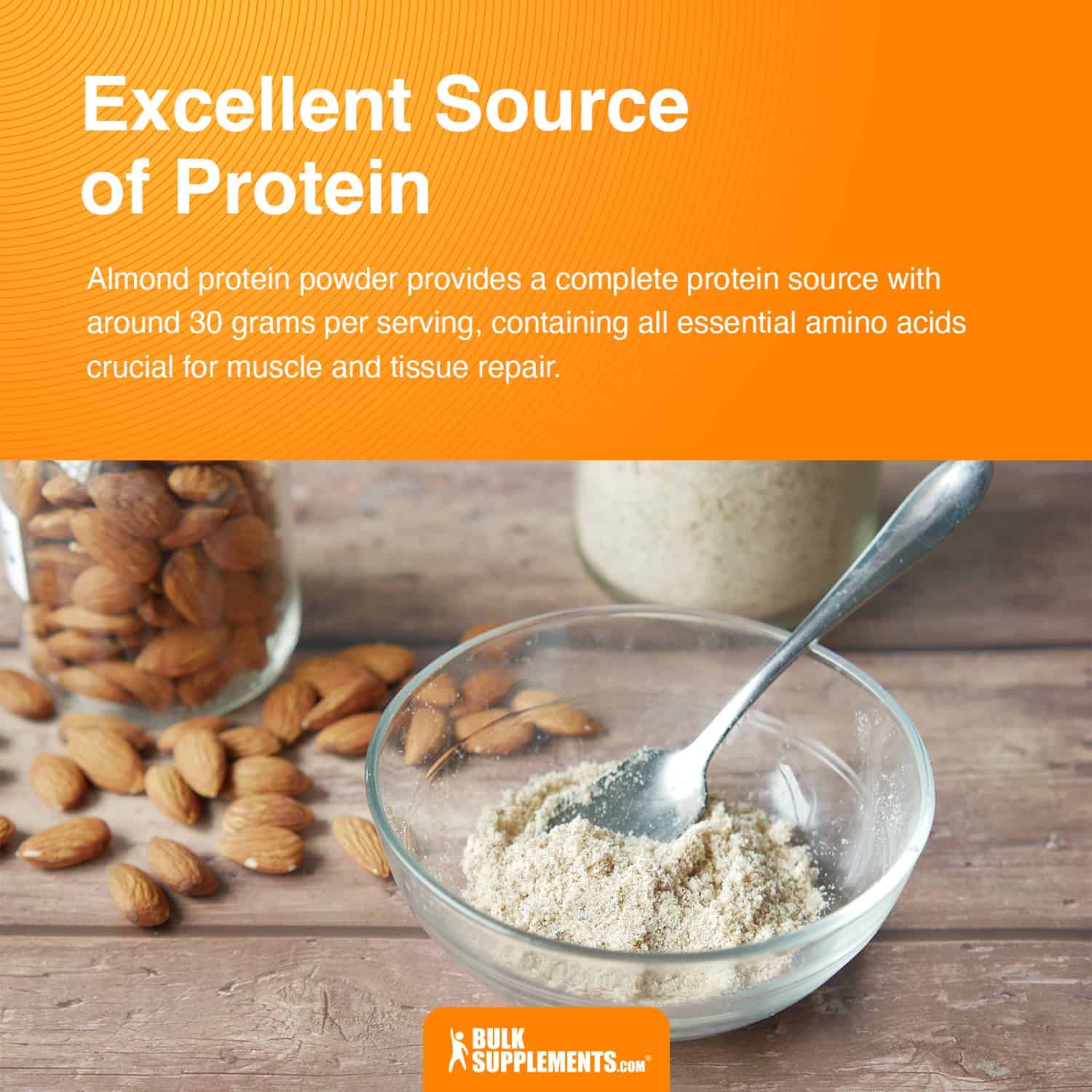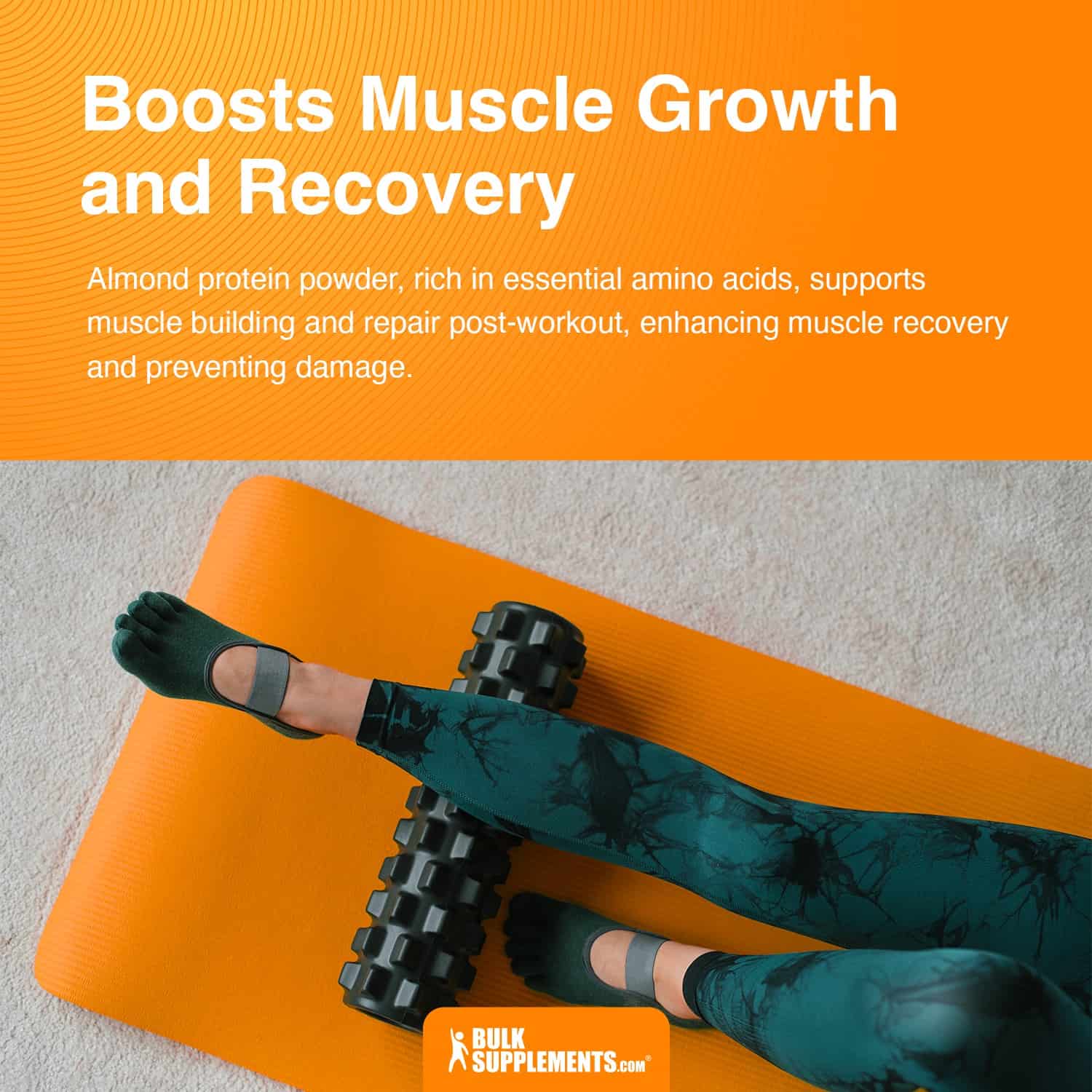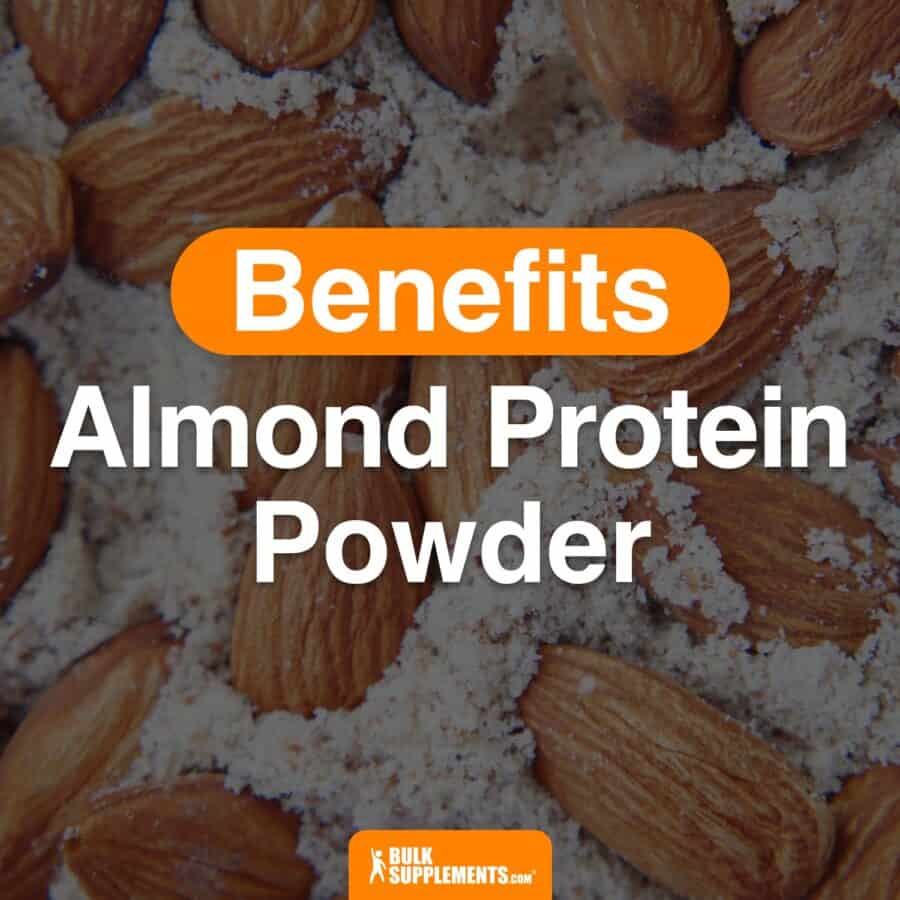The quest for gains and workouts fueled by nutrition instead of empty carbs and sugars is a journey many of us health-conscious folks have embarked on. We strive each day to power through reps and push past old limits in the gym, all while nourishing our bodies with clean, whole foods. Yet let’s be real – it can be tough to get all the protein we need from regular meals alone. That’s where a quality protein powder like almond protein can come in handy. Made from simple, nutritious almonds, this powder packs all the muscle-building amino acids and macros to boost your recovery and take your workouts to new heights.
What are Almonds?
There are many reasons why almonds should be a part of your diet. For starters, they’re incredibly nutritious. A one-ounce serving of almonds (about 23 nuts) contains 6 grams of protein, 14 grams of healthy fats, 3.5 grams of fiber, and plenty of vitamins and minerals. In fact, almonds are one of the best sources of vitamin E, magnesium, and potassium. All of these nutrients are essential for good health, and almonds are an easy and tasty way to get them.
Almonds are packed with heart-healthy nutrients, making them an excellent addition to any heart-healthy diet. They contain mono-saturated and polyunsaturated fats that help reduce LDL (bad) cholesterol while increasing HDL (good) cholesterol levels in your body. Regularly consuming almonds reduce the risk of developing heart disease.
One of the great things about almonds is that they’re incredibly versatile. They can be enjoyed raw, roasted, salted, or flavored. They can also be ground into almond butter, used as a coating for chicken or fish, or sprinkled over cereal or oatmeal. You can even use almond milk instead of regular milk in your cereals. The possibilities are endless when it comes to incorporating almonds into your diet, so get creative and experiment with different ways to enjoy them.
What is Almond Protein Powder?
Almond protein powder is exactly what it sounds like – a protein supplement made from ground almonds. It is a vegan-friendly option that is free from common allergens such as dairy and gluten. Almond protein powder is an excellent source of protein, with approximately 21 grams of protein per 100-gram serving. Beyond protein, almonds are also a good source of fiber, healthy fat, and micronutrients like vitamin E and magnesium.
One of the key benefits of almond protein powder is that it is easy to digest. Unlike some other protein sources, such as whey protein, almond protein powder doesn’t cause digestive discomfort in most people. Additionally, almond protein powder is less likely to cause negative side effects such as bloating, gas, or stomach upset, which can be a common issue with some other types of protein.
In recent years, research has shown that almonds, and by extension, almond protein powder, may have additional health benefits beyond just protein content. Almonds are rich in phytochemicals, compounds with antioxidant properties that have been linked with reduced inflammation and improved heart health. Additionally, almonds have been associated with improved blood sugar management, making them a good option for people who are at risk for or have diabetes.
Benefits of Almond Protein Powder
Almond protein powder is an excellent source of protein and is known for its numerous health benefits that can help you lead a healthier and more active life.
Excellent Source of Protein
Protein is an important macronutrient that is necessary for building and repairing muscles and tissues. When it comes to protein, almond protein powder has got you covered. With about 30 grams of protein, it has more protein than many other plant-based protein powders. Not only that, but it is a complete protein, meaning it contains all the essential amino acids that our body needs but can’t produce on its own.

Low in Carbs and Sugar
If you are looking for a low-carb or low-sugar protein option, it is a great choice. With only two grams of carbs and zero sugar, it is ideal for those who want a protein supplement without any added sugars or artificial sweeteners. The low glycemic index of almond protein powder means that it won’t cause a spike in blood sugar levels, making it perfect for people with diabetes or anyone looking for a healthier protein option.
Robust in Nutritional Value
It is made from raw almonds that have been finely ground. The process doesn’t involve any artificial preservatives or chemicals, so the powder retains all the nutrients of the raw almonds. Almond protein powder is a rich source of vitamin E, magnesium, fiber, and heart-healthy fats which can optimize overall health. Magnesium is necessary for many essential bodily functions like heart rhythm, muscle relaxation, and circulation.
Helps in Weight Loss
It is perfect for people who are trying to lose weight. Protein is an essential nutrient for weight loss, as it keeps you feeling full for a longer period, reducing the urge to snack or eat larger portions. Additionally, almond protein powder is low in calories and high in fiber, which can help with digestion and promote feelings of fullness. By incorporating almond protein powder in your diet you can easily reduce your calorie intake and feel full throughout the day.

May Improve Blood Sugar Control
It is low in carbohydrates and high in protein, making it an excellent choice for people who need to manage their blood sugar levels. Studies show that consuming almond protein powder can help regulate blood sugar levels, prevent insulin resistance, and improve insulin sensitivity, reducing the risk of type 2 diabetes.
Potential to Lower Blood Pressure
High blood pressure is a common problem that can lead to various health issues such as heart disease and stroke. It contains essential minerals like potassium and magnesium that are known to lower blood pressure levels. Studies show that consuming almond protein powder can help reduce systolic blood pressure by up to 5 points.
May Boosts Muscle Growth and Recovery
It is a complete protein source that contains all the essential amino acids required for building and repairing muscle tissue. It is an excellent choice for people who are looking to build muscle mass or recover after a workout. Studies show that consuming almond protein powder after exercise can help improve muscle recovery and prevent muscle damage.

May Reduce Cholesterol
High levels of cholesterol can lead to the buildup of plaque in your arteries, increasing the risk of heart disease and stroke. It contains healthy fats like monounsaturated and polyunsaturated fats that are known to lower LDL (bad) cholesterol levels and increase HDL (good) cholesterol levels. Studies show that consuming almond protein powder can help decrease total cholesterol levels by up to 10%.
Contains Healthy Fats
It is rich in healthy fats, including monounsaturated and polyunsaturated fats. These fats are essential for maintaining good health and can help reduce the risk of heart disease. In addition, healthy fats are critical for athletes who are looking to build muscle because they can help with muscle repair and recovery.
May Boost Immune System
It is high in vitamin E, which helps in boosting our immune system. It contains antioxidants that can help protect our body against free radicals and oxidative damage. The vitamin E present in almond protein powder is also helpful in reducing inflammation, which is the basis for many chronic diseases. The fiber content also helps in promoting good bacteria in our gut, which can improve our overall immunity.

Fills You Up
It is a great option for people who want to lose weight or maintain a healthy weight. It is an excellent source of fiber, which helps to keep you full and satisfied for longer. Almond protein powder can be added to smoothies, muffins, or pancakes, serving as a healthy and filling snack.
Easy to Digest
Unlike other protein powders, it is easy to digest and does not cause bloating or stomach discomfort. It is a good option for people who have difficulty digesting milk-based protein.
Versatile
It is versatile and can be added to your diet in many ways. Almond protein powder can be used in baking as a substitute for flour to make healthy, protein-rich snacks. It can also be added to smoothies, oatmeal, pancakes and used as a topping for yogurt.
Vegan-friendly
For athletes who follow a vegan or vegetarian diet, finding a high-quality protein powder can be a challenge. Almond protein powder is a vegan-friendly option that provides all the benefits of other protein powders without the use of animal products. This makes it an ideal option for anyone who wants to maintain a healthy, plant-based diet while still meeting their protein needs.
Side Effects of Almond Protein Powder
Before choosing almond protein powder as your go-to protein source, be aware of its potential side effects. While it can be beneficial, especially for vegans and vegetarians, it may not be suitable for everyone.
Gastrointestinal Issues
One of the most common side effects is gastrointestinal issues. For someone who is intolerant to almonds, consuming almond protein powder can lead to bloating, gas, and diarrhea. These symptoms can be particularly concerning for those with irritable bowel syndrome (IBS).
Nutrient Interference
Another side effect to keep in mind is the potential for nutrient interference. It contains phytic acid, which can bind to and reduce the absorption of certain nutrients such as iron and zinc. This can be problematic for those who are already at risk for nutrient deficiencies.
Allergies
If you have a nut allergy, almond protein powder is not the right protein powder for you. It is important to always read the label and ensure that the protein powder you are consuming is free from any allergens that may trigger a reaction.
May Cause Kidney Stones
It contains oxalates, which are known to cause kidney stones. While almond protein powder may not directly cause kidney stones, excessive consumption could result in the accumulation of oxalates in your system. To prevent this, it is best to consume this protein powder in moderation and pair it with water to aid in flushing out excess oxalates.
High-Calorie Count
It is important to note that it is not calorie-free. In fact, it can be high in calories and fat. If you are using this protein powder as a meal replacement or as part of a weight loss plan, be mindful of its calorie count and adjust your diet accordingly.
May Low Blood Pressure
It is known to lower blood pressure, which can be beneficial for some. However, it can also cause dizziness, lightheadedness, and even fainting in some individuals. If you have low blood pressure or are using medication to manage your blood pressure, be cautious while using it.
May Contributes to Bone and Liver Disorders
It contains a high amount of oxalates which can lead to the formation of kidney stones. These oxalates can also accumulate in the bones and liver, leading to disorders. In addition, excess consumption can lead to mineral depletion in the bones.
May Impair Renal Function
Our kidneys play a vital role in filtering out waste and toxins from our body. Excess consumption can put a burden on our kidneys, leading to impaired renal function. People with pre-existing kidney problems should avoid using this protein powder.
May Increase Cancer Risk
It contains phytic acid which can lead to reduced nutrient absorption in our bodies. This factor can increase the risk of cancer in the long run. Additionally, it may contain aflatoxins, carcinogenic molds that can cause cancer over time.
May Speed up the Progression of Coronary Artery Disease
Consuming in excess can lead to inflammation in the body. This inflammation can contribute to the development and progression of coronary artery disease. Individuals with cardiovascular problems and pre-existing inflammation should not consume almond protein powder.
May Cause Thyroid Issues
It contains goitrogens, which can interfere with thyroid hormone production. If you have an underactive thyroid or are taking medication for a thyroid condition, it’s best to consult your doctor before adding to your diet.
May Cause Interference with Medications
Almonds contain phytic acid, a compound that could interfere with the absorption of certain medications, including calcium, iron, and zinc. While consuming almond protein powder alone is unlikely to cause significant issues, combining it with supplements or medications that contain these minerals could lead to a deficiency over time. Speak with your doctor before adding almond protein powder to your diet if you’re on any medications or supplements.
Is Almond Protein Powder Good for You?
Almonds are packed with vitamins, minerals, and antioxidants that can help support your overall health. When almonds are turned into protein powder, many of these nutrients are retained. Specifically, almond protein powder is a good source of vitamin E, magnesium, and fiber. Vitamin E is an antioxidant that can help protect your cells from damage, magnesium is important for bone health and muscle function, and fiber can help keep your digestive system running smoothly.
It’s worth noting that consuming almond protein powder is a sustainable choice. Almonds require less water than other types of nuts (such as cashews or macadamia nuts), and they’re often grown in drought-prone regions where water conservation is important. Additionally, almond protein powder is often made from the “byproduct” of almond milk production, which reduces waste.
Is Almond Protein Powder Low FODMAP?
Almond protein powder is an excellent choice for those following a low FODMAP diet. FODMAPs are a group of fermentable carbs that can trigger gut malabsorption, leading to digestive discomfort in people with IBS symptoms. Unlike many protein powders on the market, almond protein powder contains minimal FODMAPs, making it an ideal option for those on a low FODMAP diet.
How to Use Almond Protein Powder
Almond protein powder can be used in many ways. It can be added to smoothies or mixed with water or your milk of choice to make a nutritious shake. It can also be used to make protein bars, pancakes, baked goods, and even added to homemade nut butter spreads. You can get creative and use it in any recipe that requires a protein powder.
How to Make Almond Protein Powder
Step 1: Toast your almonds
Start with about 2 cups of raw almonds and toast them in the oven at 350°F for 10-15 minutes, stirring occasionally. This will bring out the natural oils in the almonds and give them a more nutty, rich flavor. Make sure to let them cool completely before moving on to the next step.
Step 2: Blend the almonds
Add the cooled almonds to a blender or food processor and blend on high until they are finely ground. You can add in other ingredients at this stage if desired, such as cocoa powder or vanilla extract for flavor. Keep blending until the mixture is as fine as possible, with no large chunks remaining.
Step 3: Strain the mixture
Place a fine-mesh strainer over a large mixing bowl and pour the almond mixture through. Use a spatula or a spoon to press the mixture through the strainer, removing any large pieces that didn’t blend properly. This step is important for getting a smooth, powdery texture.
Step 4: Store the powder
Transfer the almond protein powder to an airtight container and store in a cool, dry place. It will keep for about a month, but you can keep it in the fridge or freezer for longer shelf life. Use it in smoothies, oatmeal, energy bites, or any other recipe that calls for protein powder.
Step 5: Enjoy!
Now that your homemade almond protein powder is ready, you can enjoy the delicious, nutty flavor and added protein in your favorite recipes. Plus, you can feel good knowing that it’s made from wholesome, natural ingredients without any additives or preservatives.
Conclusion
Making your own almond protein powder is a simple, cost-effective way to add protein to your diet. By toasting, blending, straining, and storing your own almonds, you can have a delicious, nutritious powder on hand whenever you need it. Plus, you can customize it to your taste preferences and feel good about using natural ingredients.
Dosage
The recommended daily intake of almond protein powder depends on your weight and workout goals. As a general rule of thumb, one scoop of almond protein powder contains around 20 grams of protein, which is ideal for most individuals. You can gradually increase the dose to up to 2 scoops if you’re trying to build muscle mass.
Where to Buy Almond Protein Powder
Get your hands on Almond Protein Powder at BulkSupplements.com – your go-to source for pure dietary supplements. We’re an industry leader, offering top-notch products and supplying high-quality ingredients to renowned brands in the food and supplement industry. Rest assured, all our products undergo strict manufacturing practices and rigorous testing. Don’t miss out on the chance to try Almond Protein Powder as a dietary supplement. Place your order today at BulkSupplements.com!
BUY ALMOND PROTEIN POWDER HERE.
The Bottom Line
Almond protein powder is a great source of plant-based protein and nutrient-packed addition to any diet. However, it’s important to be aware of the side effects before consuming it. These can include gastrointestinal discomfort, acne breakouts, and changes in bowels movements. The good news is that these side effects can be mitigated by starting with a small amount and gradually increasing your consumption, drinking enough water, and speaking to your healthcare provider if you experience any adverse reactions. With this information, you can make an informed decision about whether it is right for you.
Using almond protein powder has many benefits for your overall health, but finding the right dosage is key to getting the best results. The dosage varies depending on your weight, fitness goals, and the time of consumption. Proper consumption will help you achieve your desired results. Keep in mind that the key to the perfect dosage is starting gradually and observing how your body responds. Incorporate this guide into your routine, and we assure you will see significant results in your fitness journey.
In conclusion, almond protein powder is an excellent source of protein that offers many health benefits, including improved blood sugar control, lower blood pressure, reduced cholesterol, muscle growth and recovery, and weight loss. It’s easy to incorporate into your diet, and you can use it in smoothies, baking, or cooking to add extra protein to your meals. So, if you’re looking for a healthy and natural way to get your daily dose of protein, try adding almond protein powder to your diet today!
These statements have not been evaluated by the Food and Drug Administration. These products and statements are not intended to diagnose, treat, cure or prevent any disease.


